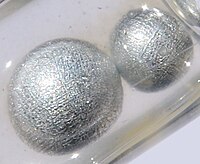
Photo from wikipedia
ABSTRACT The purpose of this study was to investigate effects of concurrent and independent administration of dietary nitrate (NO3 −), administered as NO3 –-rich beetroot juice (BR; ~12.4 mmol of… Click to show full abstract
ABSTRACT The purpose of this study was to investigate effects of concurrent and independent administration of dietary nitrate (NO3 −), administered as NO3 –-rich beetroot juice (BR; ~12.4 mmol of NO3 −), and N-acetylcysteine (NAC; 70 mg·kg−1) on physiological responses during prolonged exercise and subsequent high-intensity exercise tolerance. Sixteen recreationally active males supplemented with NO3 –-depleted beetroot juice (PL) or BR for 6 days and ingested an acute dose of NAC or maltodextrin (MAL) 1 h prior to performing 1 h of heavy-intensity cycling exercise immediately followed by a severe-intensity time-to-exhaustion (TTE) test in four conditions: 1) PL+MAL, 2) PL+NAC, 3) BR+MAL and 4) BR+NAC. Pre-exercise plasma [NO3 −] and nitrite ([NO2 −]) were elevated following BR+NAC and BR+MAL (both P < 0.01) compared with PL+NAC and PL+MAL; plasma [cysteine] was increased in PL+NAC and BR+NAC (both P < 0.01) compared to PL+MAL. Muscle excitability declined over time during the prolonged cycling bout in all conditions but was better preserved in PL+NAC compared to BR+NAC (P < 0.01) and PL+MAL (P < 0.05). There was no effect of supplementation on subsequent TTE . These findings indicate that co-ingestion of BR and NAC does not appreciably alter physiological responses during prolonged heavy-intensity cycling or enhance subsequent exercise tolerance.
Journal Title: Journal of Sports Sciences
Year Published: 2022
Link to full text (if available)
Share on Social Media: Sign Up to like & get
recommendations!